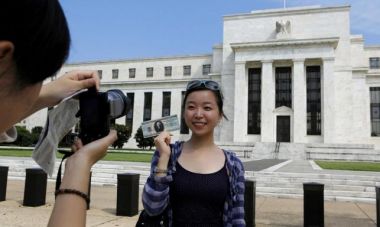Growing number of Chinese students in U.S. universities discovering Christianity

A growing number of Chinese students in American universities are discovering Christianity and Jesus.
According to Foreign Policy, more than 304,000 Chinese were enrolled in U.S. colleges and universities in 2015, many coming from Beijing and Shanghai.
While there are no definite numbers of Christian converts from mainland China, students who are immersed in campus spiritual life said the number is growing.
Gregory Jao, national director of campus engagement for InterVarsity Christian Fellowship/USA, said the organisation serves up to 1,800 overseas Chinese of the total 5,000 international students under it.
According to Valerie Althouse, who served as a chaplain at NYU for about nine years, Chinese have been the majority in the school's spiritual programming.
"Part of it is language-based — it seems most Chinese greatly desire to improve [their] English — and also [their] curiosity about Americans, American life, and even our religious beliefs and democratic system," she said.
China is the largest secular country in the world and young people often identify themselves as atheists. However, many have visited Buddhist temples to pray for good luck before exams or celebrated Chinese festivals, reported Foreign Policy and Gospel Herald.
Public preaching is banned in China and the Communist Party supervises all religious matters. The educational system emphasises patriotism and socialism.
"In the past few years, Chinese people's spiritual demands have surged," according to a May 2015 article in Southern Weekly.
On the Chinese microblogging site Weibo, users blame spiritual void for many disheartening social trends including flaunting wealth by the Chinese.
"When people have belief, our people have hope, and our nation has power," said Chinese President Xi Jinping in a February 2015 speech.
U.S. universities become the first places where young Chinese are exposed to different religious ideas.
Christian fellowships and churches assist Chinese student associations with pick-up services from airports and temporary housing at Christian homes before school housing becomes available, Foreign Policy reported.
Last August, 470 freshmen from China and their parents signed up for a paid pick-service organized by the Chinese student union at Purdue University in Indiana.
While waiting for the shuttle to be filled, the foreign students were offered drinks and snacks, courtesy of the on-campus Great Lafayette Chinese Alliance Church.
Recent arrivals of students from China fit with American Christian student groups.
Overseas Chinese students often stick to their own crowd. They are not Americanised and do not identify with less educated Chinatown immigrants.
"One day I was walking on campus, I just felt like there are waves of Chinese students walking past me," said Duncan Szeto, who has volunteered at the Mandarin-speaking fellowship at Columbia for three years. "It just hit me that there are so many Chinese students. I know each of them has a soul that God values."
The Chinese students look for a place to belong and Christian services and fellowships can assist some international students to adjust to American campus life by offering a tight-knit group with social events, often with a religious twist.
A Mandarin-language Christian fellowship at Columbia University made a guidebook for new students with tips on navigating the Columbia library system and a complete list of Morningside Heights grocery stores, its pages decorated with Bible verses.











